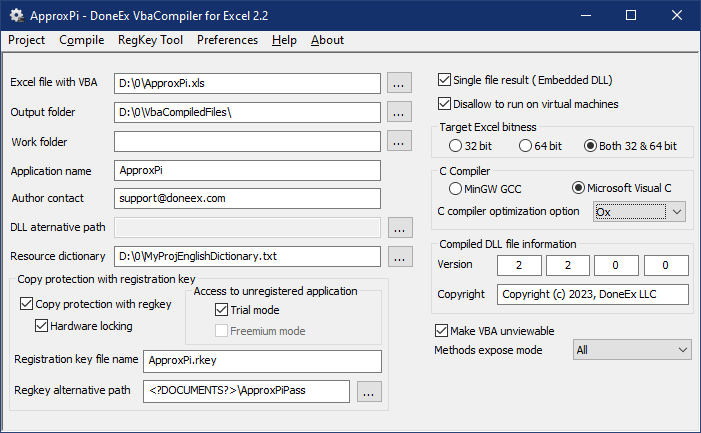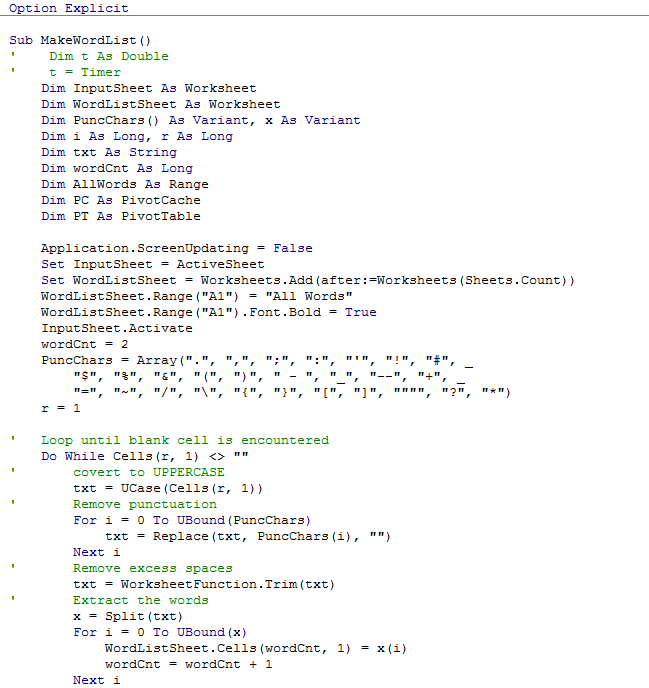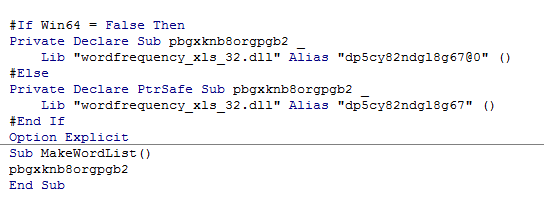VBA Compiler for Excel – Excel VBA Security Software
VBA Compiler for Excel converts the VBA code of your Microsoft Excel workbooks and Excel add-ins into the binary code of a native Windows DLL file.
After compilation your VBA code cannot be copied or recovered. This means it has the highest level of protection from cracking and any kind of attempt to steal it.
VBA Compiler is the best alternative to the common VBA code security approaches, such as VBA code obfuscation or original Microsoft Excel VBA password protection.
The workbook or Excel add-in file that has been compiled by VBA Compiler keeps its original file extension and it behaves the same way as the original file did before the compilation.
Download VBA Compiler Free Trial
Main benefits of the VBA Compiler usage
- Above all, Absolutely Impenetrable VBA code protection. It is impossible to recover your VBA code from a Windows DLL file.
- You can compile a workbook into a single file that retains the original file extension and includes an embedded DLL within the compiled workbook.
- Speed up VBA code. The performance of some VBA algorithms increases significantly after compilation with VbaCompiler for Excel.
- It is impossible to find or trace the original VBA code after the compilation process. This is because the code is compiled into the Windows DLL.
- The original file, be it a Microsoft Excel workbook or an add-in, keeps it’s original file extension that it had before compilation.
- You do not need to have any knowledge of any other programming languages except for VBA—Visual Basic for Application—in order to successfully use the VBA Compiler.
- The VBA Compiler only works with a copy of the original file, so it keeps the original file unchanged.
- The VBA code conversion during compilation happens automatically. This means it doesn’t require any input or participation of any kind in the process.
- You do not need to select which VBA functions you need to compile. Once you click on the “Compile” button all of the VBA code methods (procedures, functions and properties) will be compiled automatically.
- Compile the VBA code with copy protection along with the registration key. Such compiled VBA code will not work without a registration key, which only you will be able to produce.
- Create trial / demo version of your VBA code. Your customers will be able to try your workbook or Excel add-in without registration for a limited amount of days. As a matter of fact, you can even determine this limit of days.
How does the VBA Compiler work?
The DoneEx VbaCompiler transforms the source VBA code into C-code. It then compiles the C-language code into a native Windows DLL file.
During compilation the transformation of source VBA code goes through several stages.
Stage 1. Firstly, the VbaCompiler parses and analyses Visual Basic source code in VBA Project of workbook(.xls, xlsm, xlsb files) or Excel add-in (.xla or .xlam files).
Stage 2. Then the product generates object code based on results of stage 1.
Stage 3. Afterwards, The product generates C-language code from the object code generated in stage 2.
Stage 4. Subsequently, the VbaCompiler runs a C-compiler to compile the C-language code into a native Windows DLL.
Stage 5. Finally, in the last stage of compilation – the VbaCompiler removes the compiled VBA code from the file. The compiler then generates connective VBA code where all compiled DLL functions will be called instead of the original VBA code.
The excerpt of the original VBA code before compilation
The Same VBA Code After Compilation With VBA Compiler
As you can see in this example, the VbaCompiler has removed the content of the VBA function bodies from the VBA module. The compiler moves them to the DLL file and substitutes them with calls to DLL functions.
Protect VBA code with XCell Compiler


